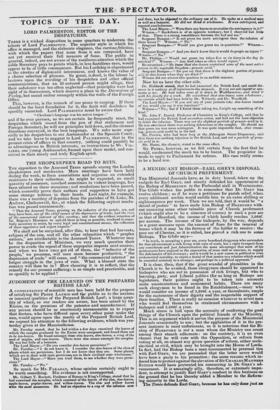JUDGMENT OF THE LEARNED ON THE PREPARED BRITISH LEAF.
A CONSULTATION of scientific men has been held for the purpose of satisfying Sir PETER LAURIE and the public as to the noxious or innocent qualities of the Prepared British Leaf; a large quan- tity of which, as our readers are aware, has been seized by the Excise, on the premises of the patentee and manufacturer. If any person should be so enormously unreasonable as to expect that doctors, who have differed upon every other point under the sun, would agree upon the merits of the Prepared British Leaf, we request his attention to the following evidence, which was yes- terday given at the Mansionhouse.
Mr. Faraday stated, that he had within a few days examined the leaves of which the samples produced by the Excise were composed, and found them not to be tea-leaves. He found amongst them elm-leaves, sloe-leaves, a wing of the seed of maples, and rose-leaves. There were sloe-stones amongst the samples. He was but little of a botanist.
The Lord Mayor—" Do you consider sloe-leaves pernicious?" Mr. Faraday—" I do not know it. I consider the sloe-leaves of the class of plants which are pernicious, but I do not know that they are. Some plants, which are in their wild state pernicious, are in their civilized state wholesome." The Lord Mayor—" Have you tried them, to see whether they wete perni- cious?"
Mr. Faraday—" No."
So much for Mr. FARADAY, whose opinion certainly ought to be worth something. His evidence is not unsupported. - Mr.. Gilbert T. Burnett, Professor of Botany in King's College, stated that he had examined the samples, which consisted of the leaves of the elm, sloe-leaves, apple-leaves, poplar-leaves, and willow-leaves. The sloe and willow leaves were the most numerous. He had no objection to a cup of the infusion now and then, but be objected to the ordinary use of it. He spoke as a medical man as well as a botanist. He did not think it wholesome. It was astringent, and reputed unwholesome.
The Lord Mayor—" Were there any leaves to neutralize the astringency in it ?" Witness—" Buckthorn is of an opposite tendency, but I observed but little of that. There is a strong resemblance between the leaf and tea."
Sergeant Bompas—" Is not green tea more astringent than the infusion of these leaves ?" Witness—" No."
Sergeant Bompas—" Would you give green tea in quantities ?" Witness—. ,r( yes."
Sergeant Bompas--" And you don't know that it would do people an injury ?" Witness—" No."
Mr. Phillips—" Would not green tea taken five or six times in the day do mischief ?" Witness—" Any food taken so often would injure."
Re-examined—" He knew that sloe-leaves contained some of the most active poison in the vegetable kingdom prussicadd."
Sergeant Bompas—" Do you say that there is the slightest portion of prussic acid in sloe-leaves when they are dried ?" Witness did not answer this question in an audible manner.
Now let us hear the other side.
Dr. Birkbeck stated, that be had examined the British Leaf, and could dis- cover in it nothing at all injurious to the stomach. It was not astringent or aro- matic as tea. He had taken some of it down to Walthamstow, and tried it with his family for a week. He considered that sloe-leaves were wholesome ; an ooinion which had been held by Dr. Witherby and Dr. Woodfield. The Lord Mayor—" If you saw any of your patients take sloe-leaves instead of tea, would you say it was injurious?"
Witness—" No; but if I found them taking tea, I might say something of the kind."
Mr. John F. Daniel, Professor of Chemistry in King's College, said that he had examined the British Leaf secundum artem, and had not the least objection to drink the infusion. There was not the slightest particle of prussic acid in it. He was cenvinced there was nothing deleterious in the samples. He should say that green tea was more astringent. It was quite impossible that, after steam- ing, prussic acid could be in the leaf. Mr. Pereira, who had been long at the Aldersgate Street Dispensary, said that there was nothing injurious in the British Leaf, and not a particle of prus- sic acid in it.
Mr. Hume, the chemist, stated to the same effect.
Sir PETER, however, as we felt certain from the first that he would, condemned the mock tea to be burnt. The proprietor in- tends to apply to Parliament for redress. His case really seems to be a hard one.


















 Previous page
Previous page